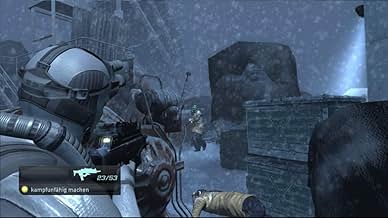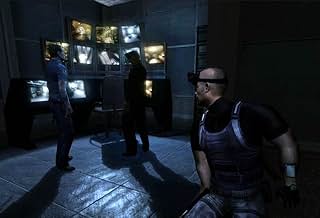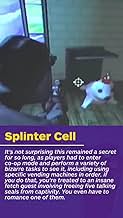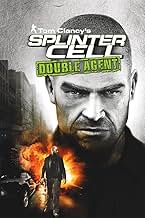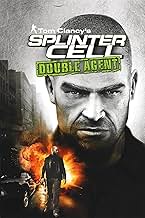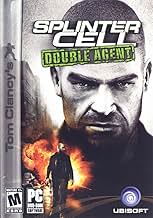IMDb RATING
7.7/10
2.4K
YOUR RATING
After losing his daughter, NSA operative Sam Fisher is given his most dangerous assignment yet: go undercover with a terrorist organization.After losing his daughter, NSA operative Sam Fisher is given his most dangerous assignment yet: go undercover with a terrorist organization.After losing his daughter, NSA operative Sam Fisher is given his most dangerous assignment yet: go undercover with a terrorist organization.
- Director
- Writers
- Stars
- Awards
- 1 nomination total
Michael Ironside
- Sam Fisher
- (voice)
Don Jordan
- Irving Lambert
- (voice)
Dwight Schultz
- Carson Moss
- (voice)
Trev Broudy
- BJ Sykes
- (voice)
- …
Terrence Stone
- Massoud
- (voice)
- …
Michael Sorich
- BJ Sykes
- (voice)
- …
Doug Stone
- Allejandro
- (voice)
Jesse Burch
- Williams
- (voice)
- Director
- Writers
- All cast & crew
- Production, box office & more at IMDbPro
Featured reviews
10 out of 10 - A Gritty Masterclass in Morality, Espionage, and Player Choice
A Turning Point for Sam Fisher and the Franchise
Splinter Cell: Double Agent isn't just a stealth action game-it's a defining chapter in the evolution of both Sam Fisher and the series as a whole. This time, the stakes aren't just about national security-they're personal, psychological, and brutally complex. Sam is deep undercover, infiltrating a domestic terrorist organization in order to destroy it from the inside. And with that shift comes a bold new gameplay direction: moral choice.
You're not just sneaking past enemies or disabling cameras-you're balancing loyalties, earning trust from both your handlers and your targets, and deciding how far you'll go, and who you're willing to sacrifice, in the name of duty.
Gameplay: Two Worlds, One Man
In Double Agent, Sam Fisher walks a razor's edge between two opposing worlds. On one hand, you're executing covert missions for the NSA. On the other, you're living with and working alongside a dangerous terrorist group who'll sniff out weakness-or betrayal-at the slightest slip.
The brilliance lies in the balance. You're often forced to choose between your orders and your cover. Should you save innocent lives and risk blowing your identity? Or sacrifice civilians to stay embedded? Every decision alters the story, shaping who trusts you, who lives, and how the game ends.
This dual-loyalty mechanic transforms the stealth genre from a tactical experience into a narrative and moral minefield.
Atmosphere: Tension You Can Feel
The tone of Double Agent is darker and more personal than any previous installment. Sam's usually calm, calculated demeanor is tested by grief, anger, and isolation, making him more human-and more dangerous-than ever.
Missions take place in icy Arctic bases, crowded urban centers, and claustrophobic safehouses. The environments are meticulously designed for vertical movement, gadget-based tactics, and smart improvisation. You feel the weight of every footstep, the consequence behind every action. Tension is not just built-it's earned.
The Emotional Core: Sam Like You've Never Seen Him
This is not the same Fisher who always had the upper hand. This Sam is weathered, wounded, and walking through moral shadows. He's not the voice of absolute justice-he's a man who's seen too much, lost even more, and is still willing to throw himself into the fire if it means protecting the innocent.
It's raw, real, and emotionally potent in a way that few stealth games have ever dared to go.
Verdict: Legendary Stealth with a Conscience
Splinter Cell: Double Agent pushed boundaries in all the right ways. It kept the tight, intelligent stealth mechanics fans loved, but layered in a complex web of morality, trust, and emotional weight. This game made you feel every decision-and it never let you forget the cost of doing the right thing.
10 out of 10 - A haunting, brilliant spy thriller that defined what Splinter Cell could be: not just a tactical operation, but a psychological reckoning.
A Turning Point for Sam Fisher and the Franchise
Splinter Cell: Double Agent isn't just a stealth action game-it's a defining chapter in the evolution of both Sam Fisher and the series as a whole. This time, the stakes aren't just about national security-they're personal, psychological, and brutally complex. Sam is deep undercover, infiltrating a domestic terrorist organization in order to destroy it from the inside. And with that shift comes a bold new gameplay direction: moral choice.
You're not just sneaking past enemies or disabling cameras-you're balancing loyalties, earning trust from both your handlers and your targets, and deciding how far you'll go, and who you're willing to sacrifice, in the name of duty.
Gameplay: Two Worlds, One Man
In Double Agent, Sam Fisher walks a razor's edge between two opposing worlds. On one hand, you're executing covert missions for the NSA. On the other, you're living with and working alongside a dangerous terrorist group who'll sniff out weakness-or betrayal-at the slightest slip.
The brilliance lies in the balance. You're often forced to choose between your orders and your cover. Should you save innocent lives and risk blowing your identity? Or sacrifice civilians to stay embedded? Every decision alters the story, shaping who trusts you, who lives, and how the game ends.
This dual-loyalty mechanic transforms the stealth genre from a tactical experience into a narrative and moral minefield.
Atmosphere: Tension You Can Feel
The tone of Double Agent is darker and more personal than any previous installment. Sam's usually calm, calculated demeanor is tested by grief, anger, and isolation, making him more human-and more dangerous-than ever.
Missions take place in icy Arctic bases, crowded urban centers, and claustrophobic safehouses. The environments are meticulously designed for vertical movement, gadget-based tactics, and smart improvisation. You feel the weight of every footstep, the consequence behind every action. Tension is not just built-it's earned.
The Emotional Core: Sam Like You've Never Seen Him
This is not the same Fisher who always had the upper hand. This Sam is weathered, wounded, and walking through moral shadows. He's not the voice of absolute justice-he's a man who's seen too much, lost even more, and is still willing to throw himself into the fire if it means protecting the innocent.
It's raw, real, and emotionally potent in a way that few stealth games have ever dared to go.
Verdict: Legendary Stealth with a Conscience
Splinter Cell: Double Agent pushed boundaries in all the right ways. It kept the tight, intelligent stealth mechanics fans loved, but layered in a complex web of morality, trust, and emotional weight. This game made you feel every decision-and it never let you forget the cost of doing the right thing.
10 out of 10 - A haunting, brilliant spy thriller that defined what Splinter Cell could be: not just a tactical operation, but a psychological reckoning.
Having played all Splinter Cell games, I find Double Agent the most intriguing, but definitely not the most challenging in terms of difficulty. (I still think Pandora Tomorrow is the most difficult to date.)
There are some very challenging moments, but those shouldn't be a problem, because you can save at any time. This is really handy if you're playing in Elite mode. The 2 most challenging levels are (to me) Kinshasa, in which you start off with no gear at all, not even night vision and you have to deal with very smart guards. Then there's New York, in which you have to deal with guards equipped with night vision. Unlike the guards with thermal vision (Chaos Theory > Bathhouse level > shower room) there's a simple way to take out these, once you've figured it out.
I finished the 9 levels (+ 2 bonus maps) in a day and a half, so I was quite disappointed that it was all over so soon. (That's what happens when you play day and night, lol.) One of those bonus maps is definitely the weirdest level in Splinter Cell history!
The replay value is VERY high, since you can change the story as you choose for either JBA (the terrorist group Sam has infiltrated) or NSA (the government agency that Sam works for). After every completed mission, you'll find out which side is suspicious of you and who is confident of you. It's up to you to keep both sides satisfied. For example: you can choose to disregard opportunity objectives for the JBA in order to keep the NSA satisfied.
The enemies have gotten smarter. Guards patrolling in dark areas almost always have a flashlight. If they don't, then they probably carry a torch. They have also invested a serious amount of money in security cameras, lasers of different kinds and non-lethal ammunition. From the moment your visibility meter lights up even a little, they'll check out what they saw. (And sometimes they notice your presence when you're completely covered in shadows.) Their hearing has gotten a lot better too, so you should always be sneaking, if you didn't do that already. You'd better not take your gun out if an enemy is standing a few yards further, because they'll hear it. These enemies are very sophisticated and smart and that's what makes them so cool. The interrogations are always worth listening at, not always to collect information, but also for fun. The real challenge will be on the day that Ubisoft will create enemies with random patrolling routes.
A new, and I must say a very satisfying difficulty is Elite. You unlock this difficulty by beating the game. You have no weapons, no gadgets. Only the OCP to jam cameras/lights, a knife and the ability to whistle. You have to rely on your map and your sneaking skills. It's so much fun, but might get the unexperienced 'splinter cells' extremely frustrated. Be sure to keep your eyes open for flash bangs and smoke grenades in dark corners, because if they're there, you bet you need them later on. The whole game can easily be played in Elite mode, when you decide to game on a lazy Sunday afternoon. You have to take your time to do this, thinking about the different routes you can take, memorizing patrol routes of guards, etc. You'll start to appreciate it more and more every time you play it. Another improvement is that you can't accidentally whistle by pushing the wrong button.
There are also levels in which you have a teammate. You can tell them to wait or follow, which comes in handy if you want to explore the environment and take out the hostiles before they open fire on one of you. (Sam carries an adrenaline syringe, just in case.)
The controls are the same as in Chaos Theory, so it's easy to catch up on that, if you played it. The voices are again very well done and very realistic, maybe even better than in Chaos Theory. Sound and graphics are as good as always. The music alone is worth listening at. If there should be a soundtrack coming out, I'm definitely gonna buy one.
I wouldn't recommend this game to those that haven't played Splinter Cell games before. You always can, of course. It's not that hard to get to know the controls and the people. It's just more fun to play this game after you know what missions Sam has done in the previous games.
I'm going to rate it 10/10, because of the great time I had while playing. I have to say though that 2 levels take place in the same environment, which narrows the adventure down a bit. And also that it can be finished in no time. It's very different from the other Splinter Cell games, but I like this new approach. (I do miss Sam's haircut though :) Aside from that, it's worth every cent and minute of your time.
There are some very challenging moments, but those shouldn't be a problem, because you can save at any time. This is really handy if you're playing in Elite mode. The 2 most challenging levels are (to me) Kinshasa, in which you start off with no gear at all, not even night vision and you have to deal with very smart guards. Then there's New York, in which you have to deal with guards equipped with night vision. Unlike the guards with thermal vision (Chaos Theory > Bathhouse level > shower room) there's a simple way to take out these, once you've figured it out.
I finished the 9 levels (+ 2 bonus maps) in a day and a half, so I was quite disappointed that it was all over so soon. (That's what happens when you play day and night, lol.) One of those bonus maps is definitely the weirdest level in Splinter Cell history!
The replay value is VERY high, since you can change the story as you choose for either JBA (the terrorist group Sam has infiltrated) or NSA (the government agency that Sam works for). After every completed mission, you'll find out which side is suspicious of you and who is confident of you. It's up to you to keep both sides satisfied. For example: you can choose to disregard opportunity objectives for the JBA in order to keep the NSA satisfied.
The enemies have gotten smarter. Guards patrolling in dark areas almost always have a flashlight. If they don't, then they probably carry a torch. They have also invested a serious amount of money in security cameras, lasers of different kinds and non-lethal ammunition. From the moment your visibility meter lights up even a little, they'll check out what they saw. (And sometimes they notice your presence when you're completely covered in shadows.) Their hearing has gotten a lot better too, so you should always be sneaking, if you didn't do that already. You'd better not take your gun out if an enemy is standing a few yards further, because they'll hear it. These enemies are very sophisticated and smart and that's what makes them so cool. The interrogations are always worth listening at, not always to collect information, but also for fun. The real challenge will be on the day that Ubisoft will create enemies with random patrolling routes.
A new, and I must say a very satisfying difficulty is Elite. You unlock this difficulty by beating the game. You have no weapons, no gadgets. Only the OCP to jam cameras/lights, a knife and the ability to whistle. You have to rely on your map and your sneaking skills. It's so much fun, but might get the unexperienced 'splinter cells' extremely frustrated. Be sure to keep your eyes open for flash bangs and smoke grenades in dark corners, because if they're there, you bet you need them later on. The whole game can easily be played in Elite mode, when you decide to game on a lazy Sunday afternoon. You have to take your time to do this, thinking about the different routes you can take, memorizing patrol routes of guards, etc. You'll start to appreciate it more and more every time you play it. Another improvement is that you can't accidentally whistle by pushing the wrong button.
There are also levels in which you have a teammate. You can tell them to wait or follow, which comes in handy if you want to explore the environment and take out the hostiles before they open fire on one of you. (Sam carries an adrenaline syringe, just in case.)
The controls are the same as in Chaos Theory, so it's easy to catch up on that, if you played it. The voices are again very well done and very realistic, maybe even better than in Chaos Theory. Sound and graphics are as good as always. The music alone is worth listening at. If there should be a soundtrack coming out, I'm definitely gonna buy one.
I wouldn't recommend this game to those that haven't played Splinter Cell games before. You always can, of course. It's not that hard to get to know the controls and the people. It's just more fun to play this game after you know what missions Sam has done in the previous games.
I'm going to rate it 10/10, because of the great time I had while playing. I have to say though that 2 levels take place in the same environment, which narrows the adventure down a bit. And also that it can be finished in no time. It's very different from the other Splinter Cell games, but I like this new approach. (I do miss Sam's haircut though :) Aside from that, it's worth every cent and minute of your time.
This review is for the version released for the Wii. After the meaningless death of his daughter, Sam feels that he has nothing left to lose. Thus, he is sent on an insanely dangerous assignment that he would not have agreed to before: Undercover in a terrorist group. You now get objectives(some of them timed) from both them and the NSA, and you can't afford to lose the faith of either(and it will directly affect, for example, the equipment that you get; and in case you're wondering why you get to use the spy stuff, yes, it is explained... sorta). It can be debated if they went far enough with that(because if it does happen, you get a chance to fix it, though you have to be fast), but in Ubisoft's defense, gamers today won't put up with having to start all over(not saying that's bad, only that we are demanding in different ways, today). You get a Trust Meter that will tell you how much confidence they have in you, and you increase the amount(at the expense of how much the other organization believe in you; admittedly, it doesn't seem like they should notice or care, for a couple of them) by solving things for them. There are also several specific, vital decisions that you have to make. For example on a cruise ship, where you prevent 2000 deaths... or ensure them. Do you trade thousands of lives to potentially save millions? The story-telling in-between missions consists of full CGI cinematics that are immensely effective, very engaging and with excellent cinematography and editing, as well as an on-going phone call between the assistant director and Fisher, carried mainly by their voices, supplemented by a documentary-like mix of stills and moving footage. These two can vary based upon what choices you make. The remaining cut-scenes are in-engine. This has a genuinely compelling and interesting plot, with a marvelous ending. The characters are impeccably well-written(and the banter is hilarious; dialog is clever, in general), credible and well-developed. There is magnificent drama in this. This does Tom Clancy proud. The audio is spot-on. Nearly every acting performance is flawless. Sound is crisp. The score now has a gritty, "dirty" tone to it, and it fits beautifully. AI is well-done with few exceptions. The Wii-Mote is not a half bad substitute for a mouse, and prior to me trying this, you could not have convinced me that a 360 degree camera could *ever* work on a console. Controls are intuitive, easy to use, smooth and not overly sensitive. The jump is a tad awkward, since you have to shake the Nun-chuk, and it's the only one where you make that strong a movement. It took getting used to for me to be able sneak without only tapping the stick, then again, this is the first I'm playing on the thing that is this complex. The lock-picking will cause frustration, since you have to figure out exactly what specific positions that you have to hold the 'Mote in. It takes practice(not to mention patience). Hacking in this is *fun!* The game-play is not cannibalized for the port(I have read that it is the same as the one for the PS2; I cannot confirm or deny that). Graphics are probably the greatest loss, revealed particularly by the difference between light and darkness not being as visually obvious(with that said, you can tell with no problems; the indicator in the HUD works perfectly) as on the other platforms. Animation suffers slightly, as does FX. Fire and water look OK. Throwing bottles, etc., to distract is useless(however, the whistling works nicely), and I maintain that one of the regular knocking out moves looks like how a five-year-old would push off someone mean; then again I'm not on any special forces team. The occasional ally feature is a nifty addition, with you and them helping each other past obstacles. This comes with split-screen Co-Op multi-player, that I have yet to try. You can save at any time in this, if there is only one file(thankfully, you can restart from checkpoint too). The levels are well-designed(and you can go back to the beginning of them at any time, and replay any that you have completed); the initial one will introduce you to what you can do in the game(and early on, you get the option of watching training videos, which are short, sweet and to the point), the environments are well-done, the finale is awesome, and there are memorable ones, including one taking place *on top of a subway train*, where you(automatically) duck to avoid getting crushed against the lower parts of the ceiling("I'm taller than you"), and one where you defuse bombs, and it is the most entertaining and tense time I've had playing a Splinter Cell game(meaning, of these four). Meanwhile... they continue to be just about entirely linear. Apart from the consequences that shape the branching story-line, the player has relatively little freedom in this. Does it bother no one else? I am comparing it to the Hit-man and Commandos franchises, and before you say that this is plot-driven, yes, so are they, if the former more than the latter. This is my biggest problem with this series. You don't go in with a detailed plan, so it comes off as if you simply succeed as a result of a bunch of lucky coincidences(as opposed to brilliantly exploiting tiny holes in the security setup). The map could be better, it can confuse you, and you may get lost(possibly with valuable seconds ticking away), and I'm sorry, in my book, that is not where the challenge in a stealth title should come from. That is really all that you can complain of. This has a fantastic interface, it doesn't get repetitive, it's addictive and it, like the three that precede it, brings something new to SC. There is moderate to strong language in this, as well as violence and disturbing content. I recommend this to all fans. 9/10
*NOTE: This is a review of the XBOX 360 version of Double Agent.
Splinter Cell: Double Agent is a welcome change to the normal strictly stealth based game-play of old. This time its far more action-packed, the graphics of course have improved and the story is far more deeper, involved and intriguing. But there is one element of the game that truly sets it apart from the series and video gaming in general; the captivating integration of working for two organizations and the decisions Sam is left with, creating a dynamic and original form of game-play, to which you can choose whether to turn your back on the NSA by adapting to the terrorists way of thinking, or stick with your primary objective of successfully infiltrating and destroying the terrorists organization from within. For every objective in each level, there is a possibility of losing or gaining trust from either the NSA or the JBA. These such elements makes this game slightly in contrast with the previous editions, mainly due to the fact that the first 3 had a mildly involving story, while Double Agent couldn't be any more interesting.
This being said, the game is not without it's flaws. Firstly, the style of graphics may not suit some and frankly, I for one preferred the old. The new style indeed has more details and such, this is a given considering it's on a more powerful console, but this does not necessarily mean it's an improvement. The familiar style of the first 3 had amazing lighting effects and a slight contrast between dark and light, which was visually original and fresh, while Double Agent loses this imagery somewhat. Secondly, the camera angle can be a nuisance, it is very close up and take a bit of getting used to and sometimes gets in the way of things, for instance, seeing nearby enemies while hiding behind a wall etc.
But the quality outweighs the flaws by a mile, this game is a fantastic, intense tour de force and a revolution in gaming storyline. Double Agent is an essential purchase and sits proudly at the top of the not-so-populated Stealth Genre and is a fantastic edition to the ever-so-great Splinter Cell franchise.
Splinter Cell: Double Agent is a welcome change to the normal strictly stealth based game-play of old. This time its far more action-packed, the graphics of course have improved and the story is far more deeper, involved and intriguing. But there is one element of the game that truly sets it apart from the series and video gaming in general; the captivating integration of working for two organizations and the decisions Sam is left with, creating a dynamic and original form of game-play, to which you can choose whether to turn your back on the NSA by adapting to the terrorists way of thinking, or stick with your primary objective of successfully infiltrating and destroying the terrorists organization from within. For every objective in each level, there is a possibility of losing or gaining trust from either the NSA or the JBA. These such elements makes this game slightly in contrast with the previous editions, mainly due to the fact that the first 3 had a mildly involving story, while Double Agent couldn't be any more interesting.
This being said, the game is not without it's flaws. Firstly, the style of graphics may not suit some and frankly, I for one preferred the old. The new style indeed has more details and such, this is a given considering it's on a more powerful console, but this does not necessarily mean it's an improvement. The familiar style of the first 3 had amazing lighting effects and a slight contrast between dark and light, which was visually original and fresh, while Double Agent loses this imagery somewhat. Secondly, the camera angle can be a nuisance, it is very close up and take a bit of getting used to and sometimes gets in the way of things, for instance, seeing nearby enemies while hiding behind a wall etc.
But the quality outweighs the flaws by a mile, this game is a fantastic, intense tour de force and a revolution in gaming storyline. Double Agent is an essential purchase and sits proudly at the top of the not-so-populated Stealth Genre and is a fantastic edition to the ever-so-great Splinter Cell franchise.
Despite the fact CT is recognized as the goat in the splinter cell series, I beg to differ. I had played the 360 version way back in 2006 and thought it was good but nothing special. Im just now playing the original Xbox version of DA in 2023 and all I can say is WOW it's a fantastic game. I tried replaying CT(first time in 15 years) right after I beat DA and it just didn't do it for me. I personally found the story of infiltrating the terrorist group(JBA) to be more engaging and with the critical choices you have to make in the game is outstanding. The hit detection while shooting is also 100% better than CT. For whatever reason, you constantly miss headshots at point blank range repeatedly. Nevertheless, I know I'm in the minority but Double Agent(ver 2) is my personal pick of best Splinter Cell game.
Did you know
- TriviaEach version of the game (X-BOX, X-BOX 360, PS2) differs.
- GoofsMr. Fisher has glowing objects in his gear. These would inevitably give away his position if he tried to hide in darkness.
- Quotes
[from trailer]
Sam Fisher: My name is Sam Fisher. I used to be a hero - now I'm a wanted man. I used to hunt terrorists - now I am one. I used to take orders - now I execute them.
- ConnectionsFeatured in Troldspejlet: Episode #35.11 (2006)
- SoundtracksSincerely Yours A82759
Written and Performed by Jake La Botz
Details
- Release date
- Countries of origin
- Official site
- Languages
- Also known as
- Tom Clancy's Splinter Cell: Double Agent
- Production company
- See more company credits at IMDbPro
- Color
Contribute to this page
Suggest an edit or add missing content

